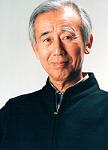Creative ensemble of Japanese traditional instruments
AURA-J Office
 |
 |
|
| Minoru Miki | Seizan Sakata | Yoko Sato |
Minoru Miki died on December 8, 2011.
President: Seizan Sakata
Artistic Director: Minoru Miki
Assistant Artistic Director: Yoko Sato
Secretary-general: Kakuzan Mori
Secretary: Ouchi Kadowaki
Adviser: Kazuo Watanabe
101, 3-5-9, Kinuta Setagaya-
ku, Tokyo 1570073
Phone +81-3749-3741
Fax +81-3749-3719
E-mail
info@ora-j.com
Web http://www.ora-j.com
Under reconstruction. Corrent pages made in 2003.
New pages will be completed by the end of 2008. @
About AURA-J
Currently, AURA-J involves not only traditional Japanese
instrumentalists, but also instrumentalists from other Asian countries. The aim
of our activities is to develop a repertoire for traditional instruments and
introduce contemporary Japanese music to the world. AURA-J commissions younger
generation composers at every opportunity. Such activities bring new
possibilities and fresh energy to the performers as well as to the
audience.
AURA-J will continue searching for new inspiration under Minoru
Miki, Artistic Director of AURA-J.
AURA-J Moments
1998 - The
independent activities of AURA-J started. Originally, AURA-J was the Japanese
instruments section of Orchestra Asia. Since the founding of PMN (Pro Musica
Nipponia), Minoru Miki has helped to organize several amateur ensembles in this
genre. However, he began to feel anxious when no other professional ensemble
appeared over a period of thirty years. When Orchestra Asia was founded in 1993,
members from PMN gave their assistance, but after several concert tours, some
solo players wanted to perform exclusively with AURA-J. In addition to the
transfer, AURA-J sets auditions and recruits aspiring players. The performance
quality of AURA-J began to match that of PMN. AURA-J used nearly the same
repertoire as PMN, but soon their execution for each piece showed different
color and interpretation.
Reference: Pro Musica Nipponia
In 1963,
when"Kurudando" was being performed, Minoru Miki decided to organize a new
ensemble involving all of the traditional Japanese instruments. As a result, the
Pro Musica Nipponia (Nihon Ongaku Shudan) was started in 1964 by fourteen
musicians. From that time until 1984, Mr. Miki, as Artistic Director, devoted
his efforts to creating many repertoires and establishing an international
reputation for PMN. He brought forward many kinds of concerts in Japan, and also
produced more than 130 concerts abroad. He won the Grand Prize of the
governmental Art Festival in 1970 with PMN's four record set. In 1981, his
"Symphony for Two Worlds", commissioned by the Gewandhaus Orchestra for their
bicentennial celebration, had its world premiere, and after more than twenty
perfrmances around the world, the piece made its American debut with the New
York Philharmonic and PMN under conductor Kurt Masur in 1994.